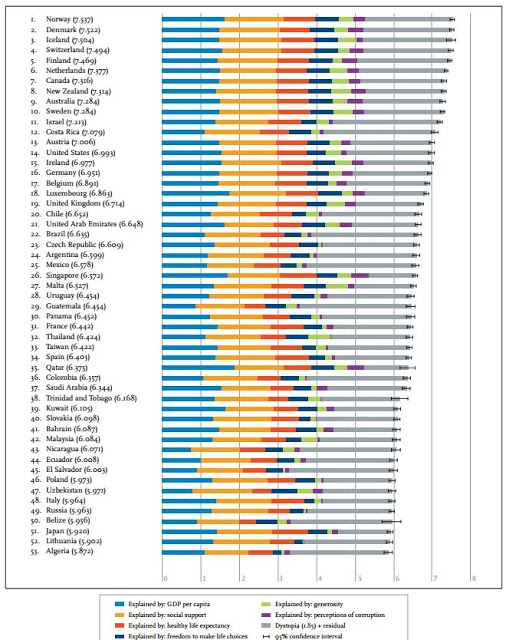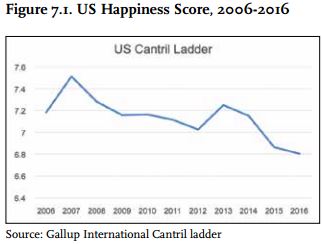

| Online: | |
| Visits: | |
| Stories: |

| Story Views | |
| Now: | |
| Last Hour: | |
| Last 24 Hours: | |
| Total: | |
U.S. 14th Happiest Country, Norway #1 in 5th World Happiness Report
Although the top ten countries remain the same as last year, there has been some shuffling of places in the report released today. Norway moved up from fourth place to overtake Denmark at the top of the ranking. It was followed by Denmark, Iceland, Switzerland and Finland. Canada dropped from sixth to seventh place, beneath the Netherlands.
This is the fifth annual World Happiness Report. It was edited by Helliwell of CIFAR (Canadian Institute for Advanced Research) and the University of British Columbia; Richard Layard, Director of the Well-Being Programme at the London School of Economics; and Jeffrey Sachs, Director of the Earth Institute and the Sustainable Development Solutions Network.
Canada was also highlighted for its success in multiculturalism and integration. It is sometimes suggested that the degree of ethnic diversity is the single most powerful explanation of high or low social trust, however Canada bucks this trend. While U.S. communities with higher ethnic diversity had lower measures of social trust this finding did not hold true in Canada. Canadian programs that promote multiculturalism and inter-ethnic understanding helped build social trust and decrease economic and social segregation, the authors note.
“Canada has demonstrated a considerable success with multiculturalism; the United States has not tried very hard,” writes Sachs. The next report for 2018 will focus on the issue of migration.
The World Happiness Report looks at trends in the data recording how highly people evaluate their lives on a scale running from 0 to 10. The rankings, which are based on surveys in 155 countries covering the three years 2014-2016, reveal an average score of 5.3 (out of 10). Six key variables explain three-quarters of the variation in annual national average scores over time and among countries: real GDP per capita, healthy life expectancy, having someone to count on, perceived freedom to make life choices, freedom from corruption, and generosity.
The top ten countries rank highly on all six of these factors:
1. Norway (7.537)
2. Denmark (7.522)
3. Iceland (7.504)
4. Switzerland (7.494)
5. Finland (7.469)
6. Netherlands (7.377)
7. Canada (7.316)
8. New Zealand (7.314)
9. Australia (7.284)
10. Sweden (7.284)
Full report: http://worldhappiness.report/
According to the report The central paradox of the modern American economy, as identified by Richard Easterlin (1964, 2016), is this: income per person has increased roughly three times since 1960, but measured happiness has not risen. The situation has gotten worse in recent years: per capita GDP is still rising, but happiness is now actually falling.
The US remains traumatized to this day; Trump’s ban on travel to the United States from certain Muslim-majority countries is a continuing manifestation of the exaggerated and irrational fears that grip the nation. The fifth priority, I believe, should be on improved educational quality, access, and attainment. America has lost the edge in educating its citizens for the 21st century; that fact alone ensures a social crisis that will continue to threaten well-being until the commitment to quality education for all is once again a central tenet of American society.”
Juanita Bawagan
Source:




